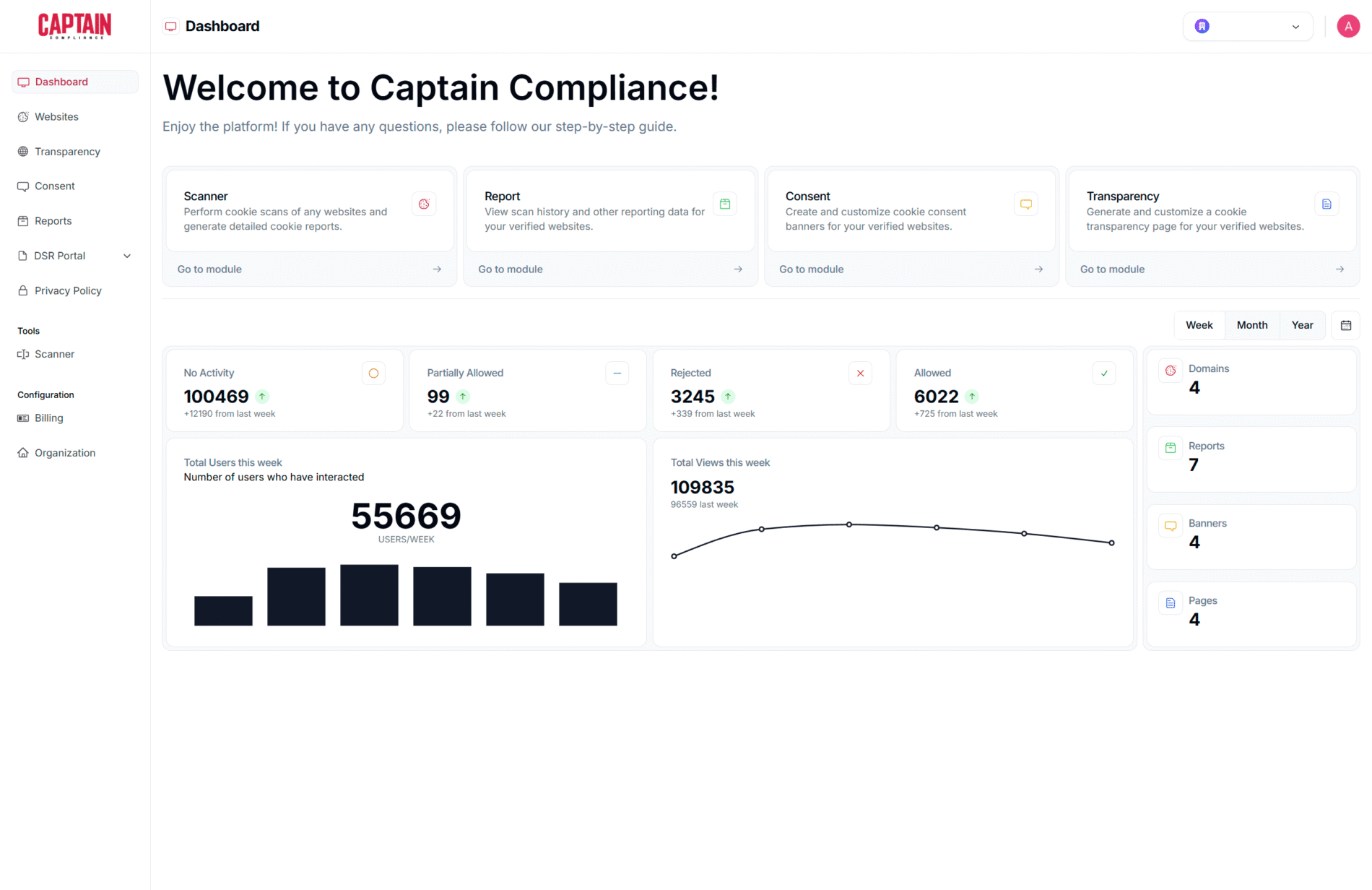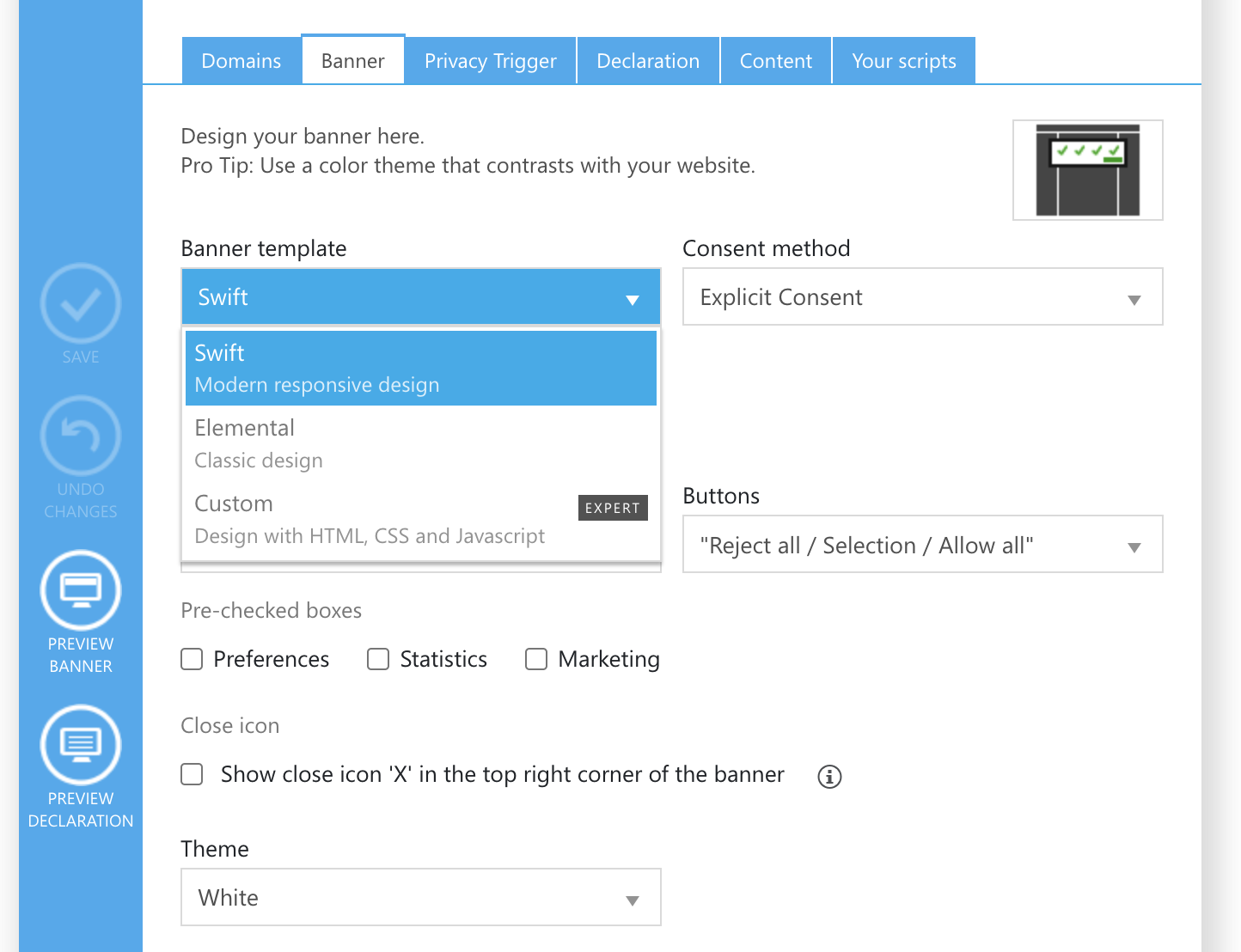Alternatives to BigID
1. Captain Compliance
+Pros
- Ecommerce-specific integration capabilities that deliver 40% deployment time reduction through pre-built connectors for Shopify, WooCommerce, and Magento.
- Pricing accessibility with 40-60% lower costs than enterprise alternatives.
- Rapid deployment capability enables initial compliance coverage within 30 days for SMB retailers.
- Proven litigation support includes documented cases of customers avoiding "millions in fines" through proactive risk identification and successful class-action resolution using audit trails.
-Cons
- Scalability constraints beyond 500,000 SKUs and accuracy degradation when processing unstructured data.
- Capability gaps compared to enterprise platforms like OneTrust and TrustArc.
- Security concerns include API vulnerabilities affecting 37% of AI consent platforms.
One highlighted feature and why it's amazing
Performs real-time identification of privacy risks and compliance gaps across ecommerce environments.

Another highlighted feature of why it’s amazing
Streamlines data subject request fulfillment from typical manual processing periods to automated responses.
2. Cookiebot CMP
+Pros
- Automated scanning efficiency through proprietary technology that automatically detects and categorizes cookies and trackers with monthly scans for ongoing compliance.
- Rapid deployment capabilities enable Shopify and WooCommerce stores to achieve compliance in under 48 hours using pre-built integrations.
- Cross-domain consent sharing across all premium plans provides superior functionality compared to competitors like CookieScript which limits this feature to higher tiers.
-Cons
- Scanner detection gaps exist in complex JavaScript environments and areas behind authentication walls, requiring manual cookie additions for comprehensive coverage.
- Integration challenges persist with certain third-party tools including Piwik Pro and HubSpot forms, where consent signals may fail to map correctly without custom coding.
- Banner customization limitations often require custom CSS or scripting, potentially necessitating $500-$2,000 in additional agency fees.
One highlighted feature and why it's amazing
Represents Cookiebot CMP's core differentiator, utilizing proprietary scanning technology that automatically detects and categorizes cookies and trackers across websites with monthly scans designed to maintain ongoing compliance.

Another highlighted feature of why it’s amazing
Operates through automated script blocking and injection, preventing third-party scripts from executing until explicit user consent is obtained, then dynamically injecting approved scripts based on user preferences.
3. Didomi Consent Management Platform
+Pros
- Real-time consent orchestration with cross-device synchronization
- Advanced Compliance Monitoring system
- Developer-first API architecture
- Ecommerce-specific integrations
-Cons
- Pricing transparency issues
- Implementation complexity
- Site speed impacts from consent management elements
One highlighted feature and why it's amazing
Enabling cross-device synchronization that reportedly reduces consent fatigue while maintaining regulatory compliance.

Another highlighted feature of why it’s amazing
Uses AI to detect non-compliant publisher activities and generate weekly violation reports, addressing critical security vulnerabilities in third-party partnerships.
Other Alternatives
IBM Guardium Data Protection
Ketch Privacy Platform
OneTrust
Securiti Privacy Platform
TrustArc
How We Researched This Guide
About This Guide: This comprehensive analysis is based on extensive competitive intelligence and real-world implementation data from leading AI vendors. StayModern updates this guide quarterly to reflect market developments and vendor performance changes.
230+ verified sources per analysis including official documentation, customer reviews, analyst reports, and industry publications.
- • Vendor documentation & whitepapers
- • Customer testimonials & case studies
- • Third-party analyst assessments
- • Industry benchmarking reports
Standardized assessment framework across 8 key dimensions for objective comparison.
- • Technology capabilities & architecture
- • Market position & customer evidence
- • Implementation experience & support
- • Pricing value & competitive position
Research is refreshed every 90 days to capture market changes and new vendor capabilities.
- • New product releases & features
- • Market positioning changes
- • Customer feedback integration
- • Competitive landscape shifts
Every claim is source-linked with direct citations to original materials for verification.
- • Clickable citation links
- • Original source attribution
- • Date stamps for currency
- • Quality score validation
Analysis follows systematic research protocols with consistent evaluation frameworks.
- • Standardized assessment criteria
- • Multi-source verification process
- • Consistent evaluation methodology
- • Quality assurance protocols
Buyer-focused analysis with transparent methodology and factual accuracy commitment.
- • Objective comparative analysis
- • Transparent research methodology
- • Factual accuracy commitment
- • Continuous quality improvement
Quality Commitment: If you find any inaccuracies in our analysis on this page, please contact us at research@staymodern.ai. We're committed to maintaining the highest standards of research integrity and will investigate and correct any issues promptly.